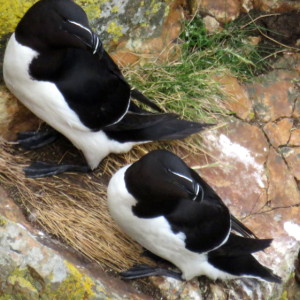Free as a bird
I'm so fortunate in being able to get to the coast just 1km from my house. It means i can keep an eye on my favourite sea birds, the razor bills, in their nesting nooks on the perpendicular cliffs. Razorbills look surprisingly formal in their crisp black and white plumage and chalk--striped bills. There are more here than in previous years and the odd grunting sounds they make can be heard even before you see them.
After blipping my picture of a heron yesterday i thought about lockdown ornithology and how people have been paying more attention to the birds around them whether in their gardens, local streets or parks. Although birders/twitchers have acquired a reputation for travelling to far-flung locations at the news of an unusual sighting, you can just as well wait for birds to come to you, even if you are completely confined. A well-known example was the "Birdman of Alcatraz", Robert Stroud (a convicted murderer diagnosed as a psychopath) who rescued three injured sparrows he found in a prison yard and took care of them. He eventually became a respected ornithologist and authority on the diseases of canaries - although not in Alcatraz.
Less well known perhaps was John Buxton who, with several colleagues, observed and recorded the behaviour of birds while incarcerated in a German POW camp during WW2. Buxton kept watch through the wire on the comings and goings of redstarts, other birdwatchers studied goldfinches, swallows and wrynecks, keeping notes on scraps of paper and old cigarette packets. Many of the prisoners became involved too and even the German guards took an interest. (A successful escape was carried out at the same time.) It's a fascinating story - there's a potted version here that's well worth reading.
In the UK, a Self-isolating Bird Club has proved tremendously popular during the coronavirus crisis and may result in many more amateur ornithologists making bird-watching a regular part of their lives.
Extra: more razorbills


Comments
Sign in or get an account to comment.


